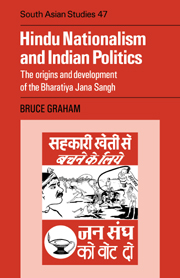Book contents
- Frontmatter
- Contents
- List of illustrations
- List of tables
- Preface
- List of abbreviations
- 1 The challenge of Hindu nationalism
- 2 The immediate origins of the Jana Sangh
- 3 The doctrinal inheritance of the Jana Sangh
- 4 The leadership and organization of the Jana Sangh, 1951 to 1967
- 5 The Jana Sangh as a Hindu nationalist rally
- 6 The Jana Sangh and interest-group politics
- 7 The Jana Sangh in electoral politics, 1951 to 1967
- 8 Conclusion
- Appendix I
- Appendix II
- Appendix III
- Appendix IV
- Select Bibliography
- Index
- CAMBRIDGE SOUTH ASIAN STUDIES
5 - The Jana Sangh as a Hindu nationalist rally
Published online by Cambridge University Press: 06 July 2010
- Frontmatter
- Contents
- List of illustrations
- List of tables
- Preface
- List of abbreviations
- 1 The challenge of Hindu nationalism
- 2 The immediate origins of the Jana Sangh
- 3 The doctrinal inheritance of the Jana Sangh
- 4 The leadership and organization of the Jana Sangh, 1951 to 1967
- 5 The Jana Sangh as a Hindu nationalist rally
- 6 The Jana Sangh and interest-group politics
- 7 The Jana Sangh in electoral politics, 1951 to 1967
- 8 Conclusion
- Appendix I
- Appendix II
- Appendix III
- Appendix IV
- Select Bibliography
- Index
- CAMBRIDGE SOUTH ASIAN STUDIES
Summary
From its earliest days, the Jana Sangh was hampered by the confusion within its ranks over what sort of party it should aim to be: was it to assert an uncompromising and monistic view of the Indian polity and aim to become the great party of Hindu nationalism or should it represent the material interests of particular economic groups in society and thus establish a sectional base for itself in a political system which was necessarily competitive and pluralistic? These roles were incompatible and the party's attempt to combine them served only to bewilder the electorate and ultimately to inhibit the party's own development.
In this chapter, we shall concentrate on the first of these aspects, the Jana Sangh's expression of Hindu nationalism, mainly with reference to particular issues in the politics of northern India.
The Jana Sangh's theory of Hindu nationalism
Whenever the Jana Sangh's leaders justified their adherence to Hindu nationalism they referred to the organicist theories of Hindu origins and history which had been formulated during the British period. Although such references were often brief and allusive, extended accounts of the basic myths occur in the reflective writings of the party's intellectuals, amongst which those of Balraj Madhok were particularly important. From a combination of these sources, it is possible to assemble the essential elements of the party's general system of beliefs.
- Type
- Chapter
- Information
- Hindu Nationalism and Indian PoliticsThe Origins and Development of the Bharatiya Jana Sangh, pp. 94 - 157Publisher: Cambridge University PressPrint publication year: 1990



